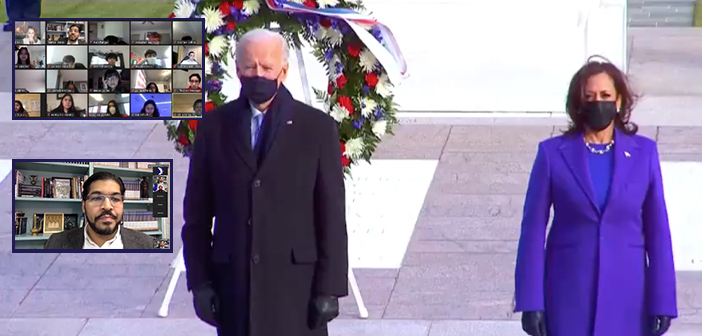Note: The Judge Barefoot Sanders Law Magnet is among the Dallas ISD specialty schools and programs currently accepting student applications through Feb. 7. Learn more and apply here.
The inauguration ceremony of Joseph Biden and Kamala Harris became a real-world learning opportunity for students at Judge Barefoot Sanders Law Magnet.
More than 30 students joined teacher Manuel Benzvi’s virtual classroom, where he played clips of the inauguration and asked questions that evoked critical thinking.
“We’re a law magnet where we study government. So this is our bread and butter. The students are very interested in these subjects,” Benzvi said. “And even if I didn’t plan the watching party, it would eventually come up in the conversation with them. Our interest is for the students to be part of history, to bear witness.”
Benzvi has taught dual-credit classes for the last two years, meaning that his students earn college credit from Dallas College after they successfully complete the course. Benzvi, who also teaches at the University of North Texas at Dallas Law School, said today’s inauguration served as yet another opportunity for his students to experience a historic moment that’s unfolding during their lifetime.
We spoke with Benzvi about the class and about his teaching techniques.
What made you decide to show the presidential inauguration to your students?
I feel like I could not let this opportunity slip by because it’s the beginning of a new term, and these students have been through a lot. Many of the students are the only ones who speak English in their households. A lot of them come from houses where they’ve grappled with the immigration policies of the prior administration. They were very expectant to see what was going to happen today with this new administration.
I want them to be part of history. I know that in their lifetimes, they’ve had a lot of ‘firsts’. And sometimes they forget about the fact that they’re living in historical times and it’s our job as educators to put them in places where they can be part of these moments. That way, they can compare them with future and past events. That’s how we make citizens who are politically responsible.
Some students mentioned that they were afraid that something bad was going to happen at the inauguration, and I think the fact that nothing bad happened… They will always remember it. And they’ll have hope for the future. Especially since, for a lot of them, the past administration was very harsh.
What is it like to be a government teacher during these politically-tumultuous times?
More than teaching them what to believe, I put things in front of them for their consideration and facilitate the teaching process. I’ve had great educators throughout my life who I owe a lot to, because of the things that they’ve been able to clarify and the experiences that they’ve been able to provide for me. And I try to emulate that, and that’s why I’m doing this. I put students in a position to have experiences that they could carry into the future.
How do you teach a government class neutrally?
It’s very difficult, and I know that I have to be very, very careful with teaching high school students, because they’re still forming their opinion. And I don’t want to sway them one way or the other. That’s an identity that they form with their ideas. To me, it is very important, because that’s what has been done with me, and that’s what I would like other teachers to do with our kids: to put everything in front of them, and for them to be able to see the whole spectrum. And that’s how I approach teaching high school students.
I have a sense of responsibility to not tell them what I believe is right or wrong. It is something that each individual has to do for themselves. I just look at myself as someone who puts everything in front of them and they will choose how to interpret things. We have a lot of group discussions, and their peers are always very influential in their thinking, sometimes even more than I can be.

